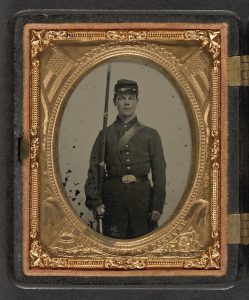Reconsidering Humor in Civil War Primary Sources

Someone challenged me to read The Gift of Fear by Gavin de Becker, and it’s been one of my recent “non-history” books. However, that doesn’t mean I didn’t *think* about history while reading.
While several sections caught my eye about predictions of and human reactions to violence, the short section on intuition expressing itself as humor was a thought-provoking reminder for the Civil War era.
“The intuitive signal of the highest order, the one with the greatest urgency, is fear…. The next [descending] level is apprehension, then suspicion, then hesitation, doubt, gut feelings, hunches, and curiosity. There are also nagging feelings, persistent thoughts, physical sensations, wonder, and anxiety…. There is another signal people rarely recognize, and that is humor.”[i]
“Humor, particularly dark humor, is a common way to communicate true concern without the risk of feeling silly afterward, and without overtly showing fear. But how does this type of remark evolve? One doesn’t consciously direct the mind to search all files for something funny to say…. With this type of humor, an ideas comes into consciousness that, in context, seems so outlandish as to be ridiculous. And that’s precisely why it’s funny. The point is, though, that the idea came into consciousness. Why? Because all the information was there.”[ii]
“Listen to humor, particularly dark humor. It can be good for more than a laugh.”[iii]
I found it a helpful reminder to pause and reconsider the context, time and place, of the humor that is sometimes recorded in primary sources. Is the joke really a joke? Or is a rephrasing of a frightening reality that the soldier already recognized?
Source:
[i] Gavin de Becker, The Gift of Fear and Other Survival Skills that Protect Us from Violence. (New York: Dell Publishing, 1997). Page 83.
[ii] Ibid., Page 84.
[iii] Ibid., Page 86.
This is an excellent way to face the day–any time, any where. Lord knows it has helped me face so much. When I get to where I can laugh at whatever issue I am facing, I know I will–eventually–be OK.
Absolutely! Humor is often effective (and not always prompted by fear).
I liked your main point enough to comment. Whenever I read humor from the Civil War era, be it from a soldier or Lincoln, I’m often struck by how I just don’t get the joke. Seriously, what’s so funny about “Mister here’s your mule” or those dialect stories that Lincoln loved? Humor is why I think that Kenneth Greenberg was right in _Honor and Slavery_, a book that influenced me a lot. We seem to be speaking the same language as that generation, and so we ought to be able to understand their minds easily, but in fact their world was so different 150-plus years ago that we really need a translator. We don’t always think like they did, and didn’t experience a lot of what they did, which is why their apparently hilarious-at-the-time jokes can fall so flat with us.
Thanks for commenting. Right? I really find that “language divide” with political cartoons, but then when I understand the context or the wordplay it’s either funny or like Ohhhhhhhh.
This is something we’ve discussed with military friends, and I think it’s a pretty human thing to look for the humor in something dark or unfortunate. The way they put it is, “Sometimes, you have to draw a smiley face on the body bags.” Modern veterans carry that dark humor with them into civilian life, and it wouldn’t surprise me if Civil War veterans did the same. Whatever helps them cope with the horrors of war.